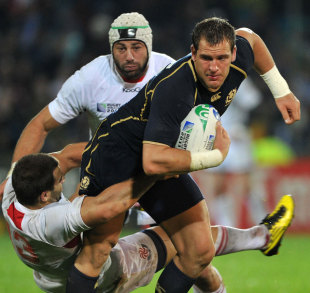|
Scottish Rugby
Lamont: Players are cheating concussion tests
ESPN Staff
July 27, 2013

Rory Lamont in action during the 2011 World Cup
© Getty Images
Enlarge
Pitchside Suspected Concussion Assessment (PSCA)
Ex-Scotland international Rory Lamont has hit out at the International Rugby Board's concussion protocols labelling them "flawed" and added players know how to cheat the tests to determine whether they are fit to play or not. The IRB is currently under-fire for its Pitchside Suspected Concussion Assessment (PSCA) which was brought in throughout the game last year. The test sees players who have suffered a suspected concussion leave the field for five minutes while the doctors determine whether they are fit enough to return to the pitch by asking the player a series of questions. But former IRB medical advisor Dr Barry O'Driscoll hit out at the governing body and called for it to review its protocols after an incident in the third British & Irish Lions Test. Australia flanker George Smith suffered an early clash of heads with Richard Hibbard and despite looking dazed and confused, Smith passed the PSCA and was back on the field minutes later. Lamont, who won 29 caps for Scotland, retired from the game last month after a series of injuries and he has slammed the IRB's protocols. "I don't know what research the IRB used for this trial but it is seriously flawed," Lamont told the Scotsman. "Everyone saw George wobbling his way off the field, clearly concussed, and then come back on. "I have suffered clean knockouts, real sleeping-on-the-floor episodes in a game, so I know the protocols inside out, the symptoms and recovery periods, and there is no way a player should be allowed to stay on the pitch after a head knock. It's insanity. People might get annoyed with me saying this, but we are seeing reckless disregard for players' welfare right now." The newspaper reports when Lamont first started running out in professional rugby, the guidelines saw a player ruled out for a mandatory three weeks if they had suffered a concussion. Coaches and players alike deemed this to be over-reacting in some cases so the process was changed. Players are now tested every day after suffering a concussion but according to Lamont, the players can beat the test. "In many cases that is because they cheat," Lamont added. "Players all talk about it. A test is done at the start of the season as a baseline test, and players who suffer from concussion have to return to that level to be passed fit to play. "But some players will deliberately do stuff in the baseline test so that their results are low, making it easier to pass after concussion. And I've seen players carrying concussion into games. They'd come off a fairly straightforward tackle, but be sitting on the ground, starting into space for a few seconds. "It's a bit like your body shutting down and re-booting. I've experienced that. I didn't hide it, but you are often ostracised by coaches who assume you are being dishonest or shirking by saying you can't train or play, so with that pressure boys do play when they have head trauma. "I'd like a return to a minimum three weeks out after concussion, because that would take away the pressure from coaches and medics to try to get a player back too early."
© ESPN Sports Media Ltd
|
Live Sports
Communication error please reload the page.
-
Football
-
Cricket
-
Rugby
-
- Days
- Hrs
- Mins
- Secs
F1 - Abu Dhabi GP
Abu Dhabi Grand Prix December 11-131. Max Verstappen ()
2. Valtteri Bottas (Mercedes)
3. Lewis Hamilton (Mercedes)
4. Alexander Albon ()
5. Lando Norris ()
6. Carlos Sainz Jr ()
-
ESPNOtherLive >>
Golf - Houston Open
Snooker - China Open
Tennis - Miami Open

